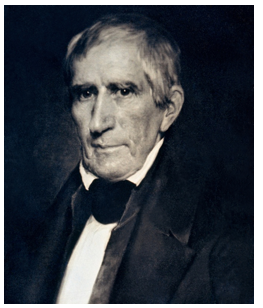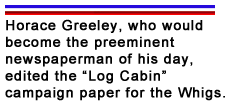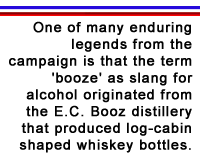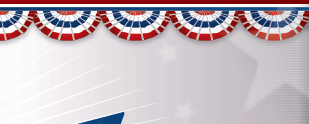 The
story of America's first modern
political campaign seems almost
too absurd to be true; it would
tax a fertile imagination to
weave Daniel Webster, Simon
Bolivar, the Shawnee leader
Tecumseh and a sitting president
with the improbable nickname
"Sweet Sandy Whiskers" into a
believable tale.
The
story of America's first modern
political campaign seems almost
too absurd to be true; it would
tax a fertile imagination to
weave Daniel Webster, Simon
Bolivar, the Shawnee leader
Tecumseh and a sitting president
with the improbable nickname
"Sweet Sandy Whiskers" into a
believable tale.
The man at the center of the
madness, William Henry Harrison
(1773 - 1841), was born into a
wealthy and aristocratic Virginia
family. After a brief stint
in medical school, Harrison found
his footing in the military, a
guaranteed path to adventure as
the young country was continually
embroiled in battle in some
corner or another.
medical school, Harrison found
his footing in the military, a
guaranteed path to adventure as
the young country was continually
embroiled in battle in some
corner or another.
Valor and family
connections landed Harrison
governorship of the Indiana
Territory, where for 12 years he
aggressively negotiated land
purchases with Native Americans,
including the Treaty of Fort
Wayne, a land grab of over three
million acres in 1809. The
Shawnee leader Tecumseh
vehemently denied the legitimacy
of the treaty and organized a
confederacy of tribes to oppose
the settlers.
In November 1811, Harrison led a
group of nearly 1,000 men toward
the Tippecanoe River in the
north. He eventually beat back
the tribes, but lost several
dozen men in the fight. He would
enjoy greater success later in
the War of 1812, but it was the
battle at Tippecanoe that stuck
with Harrison.
The next years
brought ... not much. In fact
Harrison spent the next two
decades unremarkably, variously
serving in Congress and hitting
up friends  for
appointments he thought might
advance his career. Most notably
he was dispatched by President
John Quincy Adams to serve as an
envoy to Columbia; he stayed in
Bogota long enough to announce
his disapproval of President
Simon Bolivar, blatantly
disregarding an order from the
White House to keep his nose out
of local politics. Harrison was
yanked back to America when the
Andrew Jackson administration
came to power, and he
subsequently settled in to
semi-retirement at his farm in
Ohio. He re-emerged on the
national scene in 1836 as part of
the Whig Party's ill-conceived
multi-candidate ticket created to
oppose Democrat Martin Van Buren,
who would become president.
for
appointments he thought might
advance his career. Most notably
he was dispatched by President
John Quincy Adams to serve as an
envoy to Columbia; he stayed in
Bogota long enough to announce
his disapproval of President
Simon Bolivar, blatantly
disregarding an order from the
White House to keep his nose out
of local politics. Harrison was
yanked back to America when the
Andrew Jackson administration
came to power, and he
subsequently settled in to
semi-retirement at his farm in
Ohio. He re-emerged on the
national scene in 1836 as part of
the Whig Party's ill-conceived
multi-candidate ticket created to
oppose Democrat Martin Van Buren,
who would become president.
 In
1840 the Whigs saw a window of
opportunity to dislodge the
Democrats. That window presented
itself in the form of
catastrophic financial collapse:
inflation and unemployment
soared, businesses were lost and
crop prices plummeted. Van Buren
did little to endear himself to a
frightened nation: he blamed the
crisis on unscrupulous bankers
and greedy Americans, and
maintained that the government
should not interfere with private
business.
In
1840 the Whigs saw a window of
opportunity to dislodge the
Democrats. That window presented
itself in the form of
catastrophic financial collapse:
inflation and unemployment
soared, businesses were lost and
crop prices plummeted. Van Buren
did little to endear himself to a
frightened nation: he blamed the
crisis on unscrupulous bankers
and greedy Americans, and
maintained that the government
should not interfere with private
business.
Of the losing Whig
candidates back in 1836, Harrison
was most successful, so he was
chosen to oppose Van Buren. The
Democrats must have been elated:
Harrison was old - older by 20
years than Van Buren. And he
hadn't really been involved in
the Washington political scene
for years. Even with the
financial crisis it probably
seemed like Van Buren could
secure a second term.
The law of unintended
consequences played out shortly
thereafter when a Democratic
newspaper in Baltimore openly
dismissed Harrison's  candidacy,
implying he was a simpleton,
ready to be put out to
pasture:
candidacy,
implying he was a simpleton,
ready to be put out to
pasture:
"Give him a barrel of
hard cider, and settle a pension
of $2,000 on him, and our word
for it, he will sit the remainder
of his days in his log cabin by
the side of the sea-coal fire and
study moral philosophy."
The image of
Harrison as a log cabin-dwelling
"everyman," enjoying a good cider
and a warm fire, was exactly what
the Whigs needed to energize the
masses. Hedging their bets, Van
Buren was portrayed as a
blue-blooded dandy, aloof and
unresponsive to the concerns of
the common man. In reality he was
born to a humble Dutch farming
family and left school at age
14.
The beginning of the end for Van
Buren was the "Gold Spoon
Oration" of Whig Congressman
Charles Ogle of Pennsylvania.
Ogle ostensibly took the House
floor to address a request for
funds to renovate the White
House, but instead delivered a
3-day skewering of the President,
excoriating him for what Ogle
described as an extravagant
lifestyle.
 Ogle
told his colleagues and
spectators that "Sweet Sandy
Whiskers" (the derisive Whig
nickname for Van Buren) ate his
dinners at a table arrayed with
gold utensils, and dipped his
"pretty, tapering, soft, white,
lily fingers" in fancy finger
cups paid for with the "People's
cash." Of course there weren't
gold forks or spoons in the White
House, and Van Buren actually
spent very little public money
during his term, but the
characterization of him as an
elitist had already taken
hold.
Ogle
told his colleagues and
spectators that "Sweet Sandy
Whiskers" (the derisive Whig
nickname for Van Buren) ate his
dinners at a table arrayed with
gold utensils, and dipped his
"pretty, tapering, soft, white,
lily fingers" in fancy finger
cups paid for with the "People's
cash." Of course there weren't
gold forks or spoons in the White
House, and Van Buren actually
spent very little public money
during his term, but the
characterization of him as an
elitist had already taken
hold.
Harrison on the
other hand was now the "log cabin
and hard cider" candidate, a war
hero who would inhabit the office
of the Presidency as a dutiful
proxy of the average man. Ohio
distillery E.C. Booz produced log
cabin-shaped whiskey bottles,
passed out at massive rallies
where bands played songs from The
Log Cabin Songbook, with lyrics
that reinforced the manufactured
personas:
Let Van from his
coolers of silver drink wine,
And lounge on his cushioned
settee,
Our man on a buckeye bench can
recline,
Content with hard cider is
he.
Cups, plates,
posters and flags were printed
with Harrison's face. A newspaper
called the Log Cabin covered
campaign events, printed speeches
and songs, and sold thousands of
copies each week. The Whigs
promoted their ticket with the
slogan and song "Tippecanoe and
Tyler Too" - "Tippecanoe" of
course referred to Harrison's
military victory, and "Tyler" was
his running mate, John Tyler.
On the pesky matter
of "issues" Harrison adhered to
the advice of the Whigs and kept
quiet - so much so that the
Democrats dubbed him "General
Mum."
It was an incredibly well planned
operation designed to please the
crowds, and it worked. Van Buren
for the most part ran a
traditional campaign, preferring
to concentrate on policy matters.
Toward the end, though, the
Democrats tried to counter-attack
with songs of their own:
Rockabye, baby, when
you awake
You will discover Tip is a
fake.
Far from the battle, war cry and
drum
He sits in his cabin a'drinking
bad rum.
But it was too
later. Over 80 percent of the
eligible population took to the
polls that November, and Harrison
won both the popular and the
electoral vote - the electoral by
a margin of 234 to 60.
Eager to prove he
wasn't the rube of campaign lore,
Harrison crafted a colossal
commencement speech, shoehorning
classical allusions
throughout. He let his friend and new
Secretary of State Daniel Webster
take a pass at editing it; though
Webster slashed through,
remarking he killed "seventeen
Roman proconsuls as dead as
smelts, every one of them," it
still stands as the longest
inaugural address of any
president. Harrison stood for an
hour and a half in the rainy cold
detailing the Whig agenda and
vowing, "Under no circumstances
will I consent to serve a second
term."
He let his friend and new
Secretary of State Daniel Webster
take a pass at editing it; though
Webster slashed through,
remarking he killed "seventeen
Roman proconsuls as dead as
smelts, every one of them," it
still stands as the longest
inaugural address of any
president. Harrison stood for an
hour and a half in the rainy cold
detailing the Whig agenda and
vowing, "Under no circumstances
will I consent to serve a second
term."
Fate took that
decision out of his hands -
Harrison caught pneumonia and
died a month later. "His
Accidency," as Democrats dubbed
Tyler, took the oath and
proceeded to veto nearly every
Whig bill that crossed his desk;
his cabinet resigned in disgust
and the Whigs never truly
recovered.
Sources:
Bartleby.Com.
William
Henry Harrison. Inaugural
Address. Thursday, March 4,
1841.
Bryant, William Cullen.
Power
For Sanity: Selected Editorials
of William Cullen Bryant,
1829-1861. Fordham
University Press, 1994.
EDSITEment, National Endowment
for the Humanities. The
Campaign of 1840: William Henry
Harrison and Tyler,
Too.
Encyclopædia Britannica. Retrieved October 25,
2009, from William
Henry Harrison. (2009).
HistoryNet. American
History: 1840 U.S. Presidential
Campaign.
Kingsbury, Alex. "William
Henry Harrison, Martin Van Buren,
and the Birth of the Modern
Political Campaign". U.S.
News & World Report,
January 17, 2008.
The Miller Center for Public
Affairs, University of
Virginia. William
Henry
Harrison.
Remini, Robert Vincent. Daniel
Webster: the man and his
time. New York: W.W.
Norton & Company 1997.
Tarbell, Ida M. "Abraham
Lincoln." McClure's
Magazine, Volume VI, April
1896, No. 5
Tippecanoe County Historical
Association. Tippecanoe
Battlefield
History.
Van Meter, Jan R. Tippecanoe
and Tyler Too: Famous Slogans and
Catchphrases in American
History. University Of
Chicago Press, 2008.
The White House. William
Henry Harrison.














